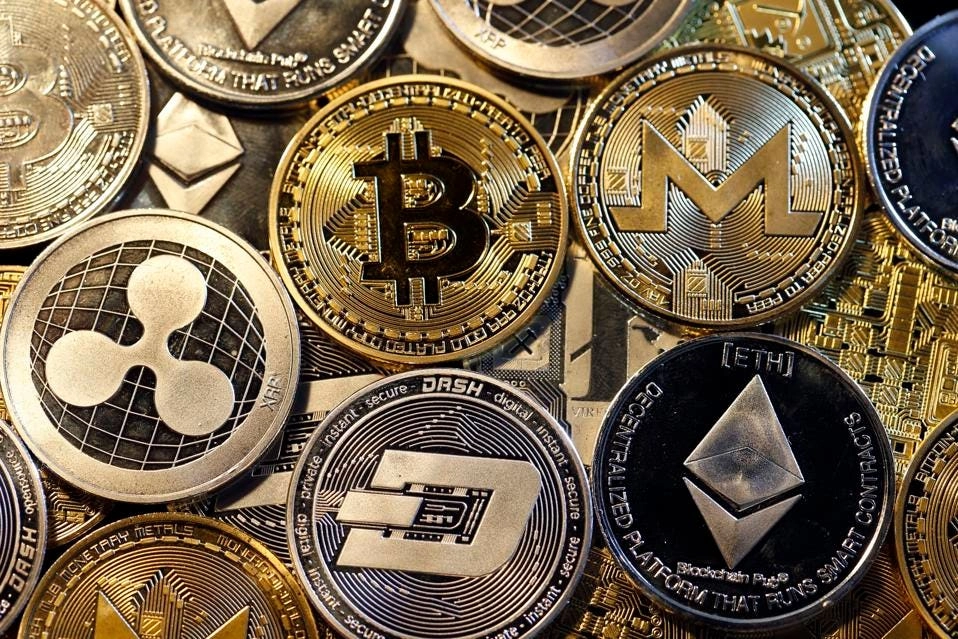
MIAMI, FLORIDA - JUNE 04: Jack Dorsey creator, co-founder, and Chairman of Twitter and co-founder & ... [+] CEO of Square arrives on stage at the Bitcoin 2021 Convention, a crypto-currency conference held at the Mana Convention Center in Wynwood on June 04, 2021 in Miami, Florida. The crypto conference is expected to draw 50,000 people and runs from Friday, June 4 through June 6th. (Photo by Joe Raedle/Getty Images) Getty Images
With bitcoin bumping up against $100,000, crypto enthusiasts are once again frothing at the mouth. The election has given a boost to crypto sponsors, miners, and owners—and anyone else who has a vested interest in that corner of DeFi. Although bitcoin has never really proven itself to be a reliable medium of exchange given its extraordinary volatility, it has shown itself to be an alternate store of value similar to gold. Every time it gets clobbered (and boy does it get clobbered: it lost nearly 80% of its value in 2022), every big step down has been followed by several massive steps upward.
For those who want leverage to crypto in an asset that has standalone value even if bitcoin collapses, consider Block Inc (SQ).
My problem with bitcoin is not that it has no value. Instead, it’s that it cannot be valued. Like gold or yen, or even a Picasso, it produces no cash (nothing wrong with speculating in artwork or precious metals but you have to know the intrinsic value is a riddle). It has no underlying yield or economic production like a stock, a bond, or real estate. Therefore discounted cash flow (DCF), the best valuation method ever created, cannot be applied to digital currency. Bitcoin could be worth $100,000 ... or a million dollars ... or $5. No one knows, and anyone who claims to know is lying.
Sometimes people point to bitcoin millionaires and billionaires as proof that it should be bought today. That is a terrible reason to buy anything. People who got in on the ground floor were lucky or smart or both. But none of that means the riches will continue. After all, some people get rich getting in on the ground floor of Ponzi schemes (if they get out in time) or become multimillionaires from a lottery ticket. That doesn’t mean that those are sensible ways to build wealth.

PARIS, FRANCE - FEBRUARY 16: In this photo illustration, a visual representation of digital ... [+] cryptocurrencies, Bitcoin, Ripple, Ethernum, Dash, Monero and Litecoin is displayed on February 16, 2018 in Paris, France. Digital cryptocurrencies have seen unprecedented growth in 2017, despite remaining extremely volatile. (Photo Illustration by Chesnot/Getty Images) Getty Images
To the extent that bitcoin has value, its value is derived from its scarcity. Like any precious metal, it lives or dies by its limited supply. Its boosters explain that its circulation is curtailed by the “halving” that puts brakes on new production over time. Thus, its amount is finite. But so is gold’s. And gold’s long-term return, except during periods of high inflation, has been mediocre. What’s more, any honest metals trader will tell you that they don’t know how much gold “should” trade for per ounce. They can only extrapolate, and that extrapolation is not based on a real economic construct (like cash yield).
Block owns nearly a billion dollars of bitcoin, and is leveraged to the crypto sector in many other ways. Its CashApp division allows for person-to-person bitcoin transfers, bitcoin purchases, and a bitcoin wallet. Block’s CEO, Jack Dorsey, is a bona fide bitcoin believer, but he has not bet the ranch on it. Bitcoin could crash to zero, and Block would be fine. Its core business is payment processing, quite apart from cryptocurrency, and it’s the market leader among small merchants. Block produces ample free cash flow, holds over $9 billion of good, old-fashioned U.S. dollars on its balance sheet and $20 billion in shareholder equity. Put simply, to be a good investment, Block does not need bitcoin. But buying Block can give you crypto exposure with much less risk than buying crypto miners, crypto exchanges, or businesses that are over-leveraged to cryptocurrency.
Best of all, and most pertinent, Block—as a stock—can be valued. Based on its future-expected discounted cash flows, Block is worth as much as $150 per share. Even in a worse-case scenario where payment-processing growth slows dramatically and bitcoin goes to zero, Block would be worth more than approximately $70 based on its intrinsic value. Of course, intrinsic value never guarantees that a stock will trade at the same level—but between crypto and stocks, real businesses have the edge any day.
Note: James Berman owns shares in Block, Inc. (SQ) both personally and in client accounts.




